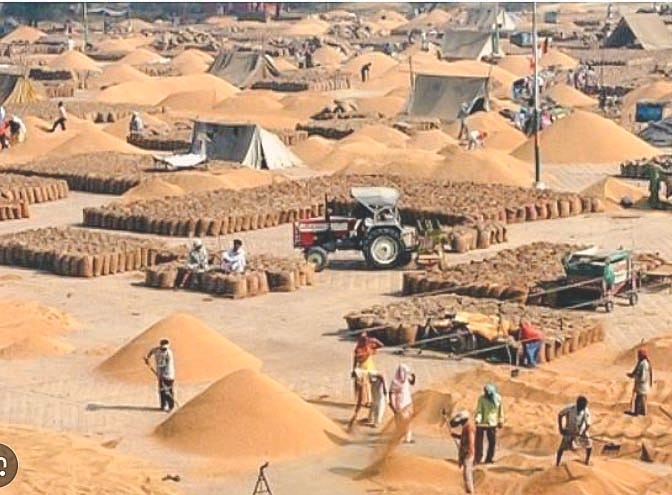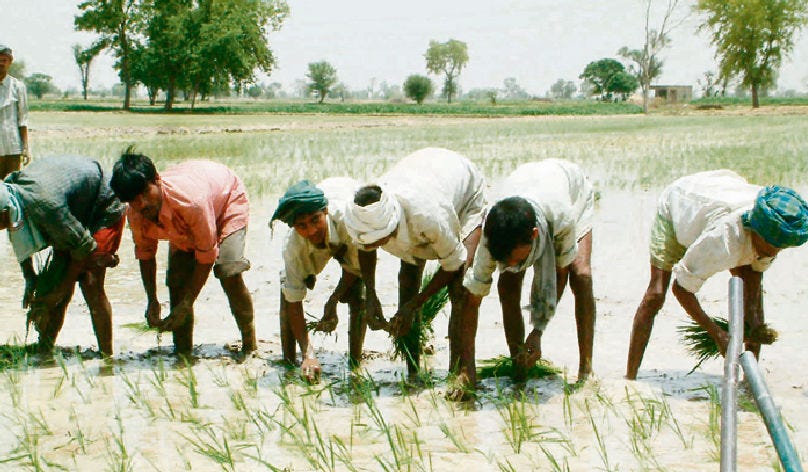SBI's Statement on MSP: Immediate Backlash from Farmer Organisations
SBI's Statement on MSP: “Ill-time and Ill-conceived”
The statement issued today by the State Bank of India (SBI) suggesting that the government should devise alternative mechanisms to the Minimum Support Price (MSP) to guarantee fair prices for farmers has immediately come under sharp criticism from multiple farmer organisations, especially in Punjab and Haryana. As SBI is effectively the official bank of the Government of India (GOI) in all its transactions, particularly in the wheat and paddy procurement, it is seen by the farmers and opposition parties as a proxy for the central government's intentions. They remind that the Prime Minister explicitly promised, while announcing the repeal of the three farm laws in November 2021, that the MSP would not only continue but also be put on a statutory pedestal, unlike under the executive instructions, as currently. Coming on the heels of a meagre increase in the MSP of the kharif crops recently announced by the GOI, this report has rattled many farmer organisations.
SBI's Statement
SBI has stated that the government should look at alternative mechanisms to MSP in order to ensure farmers receive fair prices for their produce. This statement comes amid ongoing demands from farmers for a legal guarantee of MSP for agricultural products.
Issues with the Current MSP System
Several experts have highlighted problems with the current MSP system:
Inadequate Compensation: MSP increases often do not adequately compensate farmers for increases in cultivation costs and consumer price inflation, even though the GOI claims to provide a 50% margin over all expenses, including the notional land rental.
Income Constraints: The MSP mechanism constrains farm incomes as it fails to provide fair compensation for farmers' effort, capital investment, and the uncertainty they face.
Political Hindrance: According to an SBI study, the politics surrounding MSP is hindering the adoption of smart agricultural practices. It, however, did not specify the political factors.
Need for MSP Reforms
Experts argue there is a strong need to reform the MSP system:
Agricultural Employment: Agriculture employs nearly as many people as the services sector in India and has a significant impact on consumption growth.
Fiscal Sustainability: Ensuring remunerative prices is essential, but the demanded 50% margin over costs is seen as fiscally unsustainable, as per the SBI report. Alternative models like Assured Price to Farmers (APF) with a lower margin are proposed, which are not acceptable to the farmers.
Comprehensive Reforms: Wide-ranging reforms beyond just pricing are needed to enable markets to pay fair prices to farmers and reduce dependence on MSP interventions.
Positive Outlook for Some Crops
For certain horticultural crops like tomatoes, onions, and potatoes that are not covered under MSP, the government expects a good monsoon to boost production and help moderate prices. This suggests demand-driven factors can sometimes be more effective than MSP in supporting farmer incomes for some segments.
Criticism of SBI's Statement
Experts also dispute the objections raised by SBI in its report against MSP:
Short-Term Loans: The statement that procurement of all crops at the MSP for the financial year 2024 would come at ₹13.5 lakh crore is misleading, as this is merely a short-term working capital loan. This enables immediate payment to the farmers for their produce, while the respective state governments, who also guarantee these loans, repay the same to the consortium of banks, led by SBI, as soon as reimbursement from GOI/FCI is received.
Flexibility in MSP: Experts point out that there is nothing to stop the government from announcing MSP for other crops they want to incentivise. Similarly, this is merely the floor price and does not deter private investment in agri-processing industries.
Political Interference: The SBI report has been castigated for pointing out political interference without detailing how this takes place. While agricultural and allied activities' credit ramped up from rupees 6.0 lakh crore in 2014 to 20.7 lakh crore in 2024 is appreciated, most of it is in terms of short-term crop loans rather than any long-term investment. It also includes the working capital limits of various agri-processing units, including Basmati exporters.
Impact of Export Restrictions on MSP: Any discussion on the MSP must also include the export restrictions that the GOI routinely places, thereby depriving farmers of substantial notional profits. International prices of food grains are currently high, especially in the backdrop of the Russia-Ukraine war. These restrictions prevent farmers from capitalising on lucrative global markets, exacerbating their financial struggles.
Comparison with International Subsidies
The objections regarding issues with WTO norms have also faced sharp criticism. It is pointed out that the USA and Europe provide far more agricultural subsidy than India does, and any subsidy provided is well within the WTO norms. Regarding the question of farm loan waivers, it is an entirely different matter, but it may be noted that SBI is active in terms of the loans written off for the industrial sector, as well as the shaves taken by it in proceedings of debt resolution before the NCLT.
SBI's Report: Adding Insult to Injury
SBI's unilateral report is likely to be the proverbial red rag to the bull, even as Parliament waits for the Budget session. In the backdrop of the PM-Kisan Scheme, where ₹2000—a meagre ₹500 per month— is remitted directly to the bank accounts of nearly 10 crore farms in the country every four months, this report is described by many as adding insult to injury. Rural indebtedness is on the rise, and suicides related to loan defaults in rural areas continue unabated. Thus, SBI's report is seen as not only ill-timed but also ill-conceived and intellectually unsustainable. While ensuring remunerative prices for farmers is crucial, many argue the current MSP system needs to be improved and made more robust through a holistic set of reforms and alternative mechanisms, rather than myopic quick-fixes suggested by SBI. A balanced approach considering the interests of both producers and consumers is essential to achieve long-term sustainability and fairness in the agricultural sector, including a rational import-export policy of agricultural produce.






